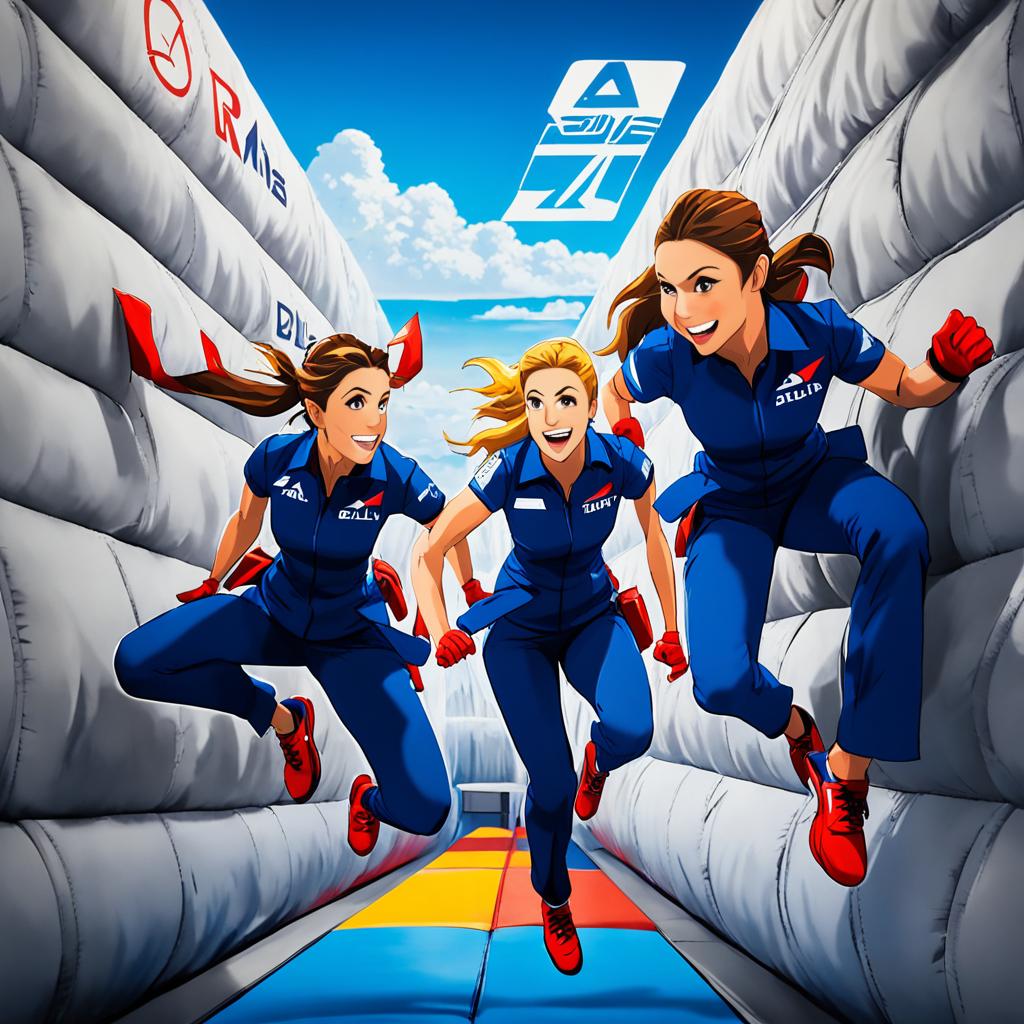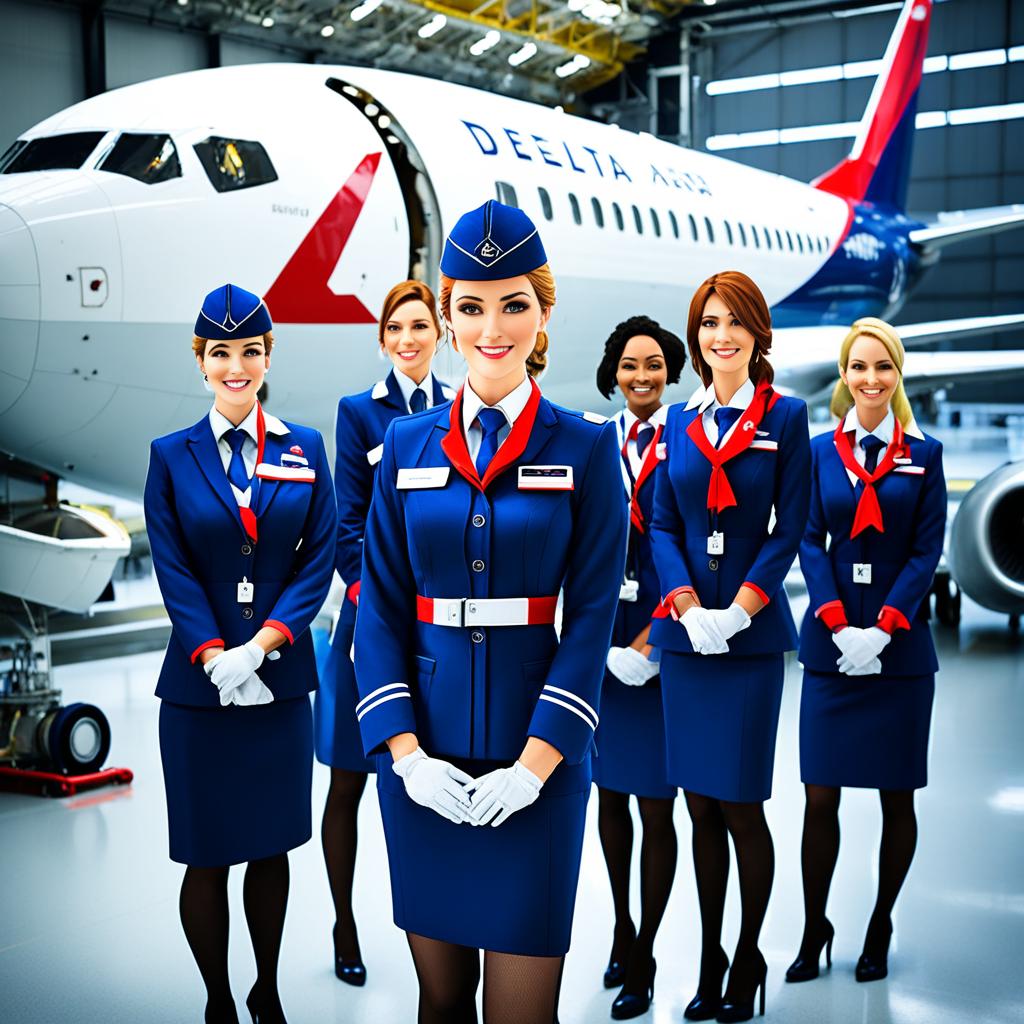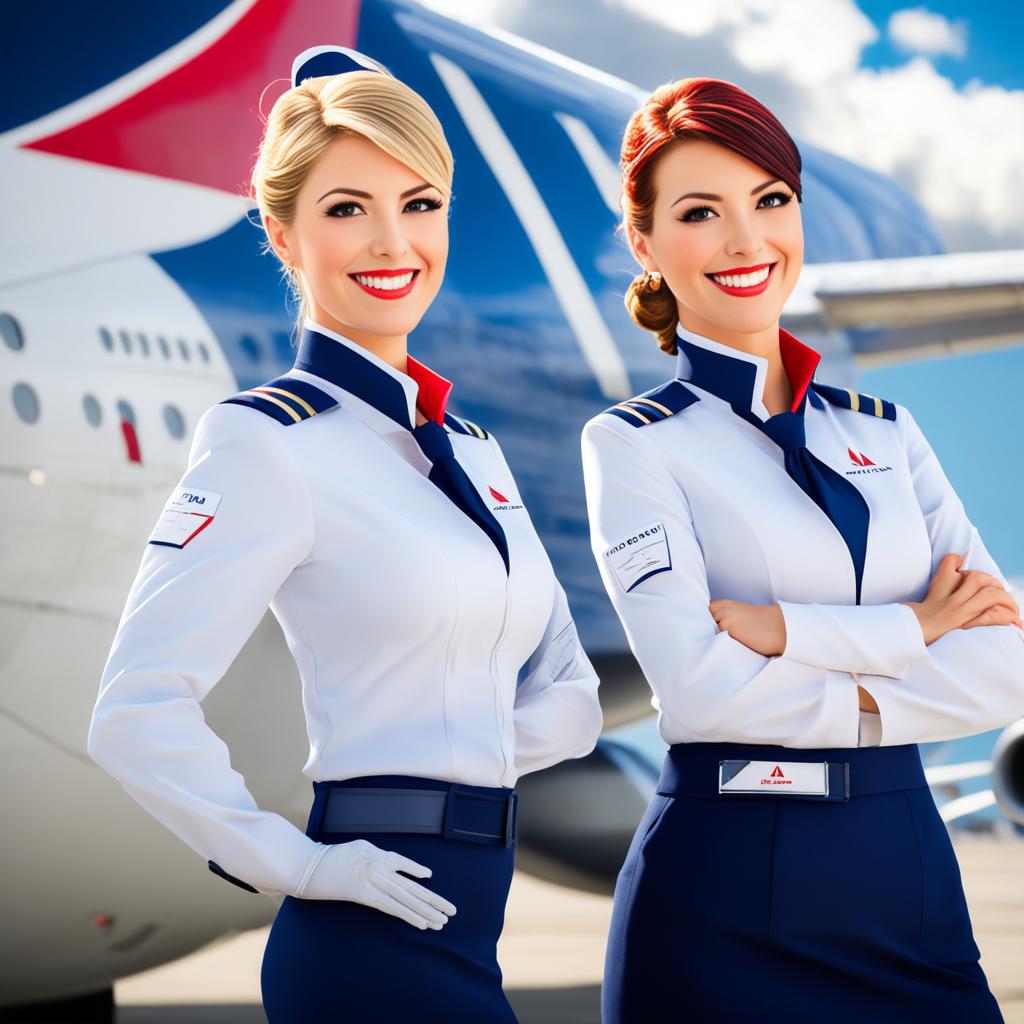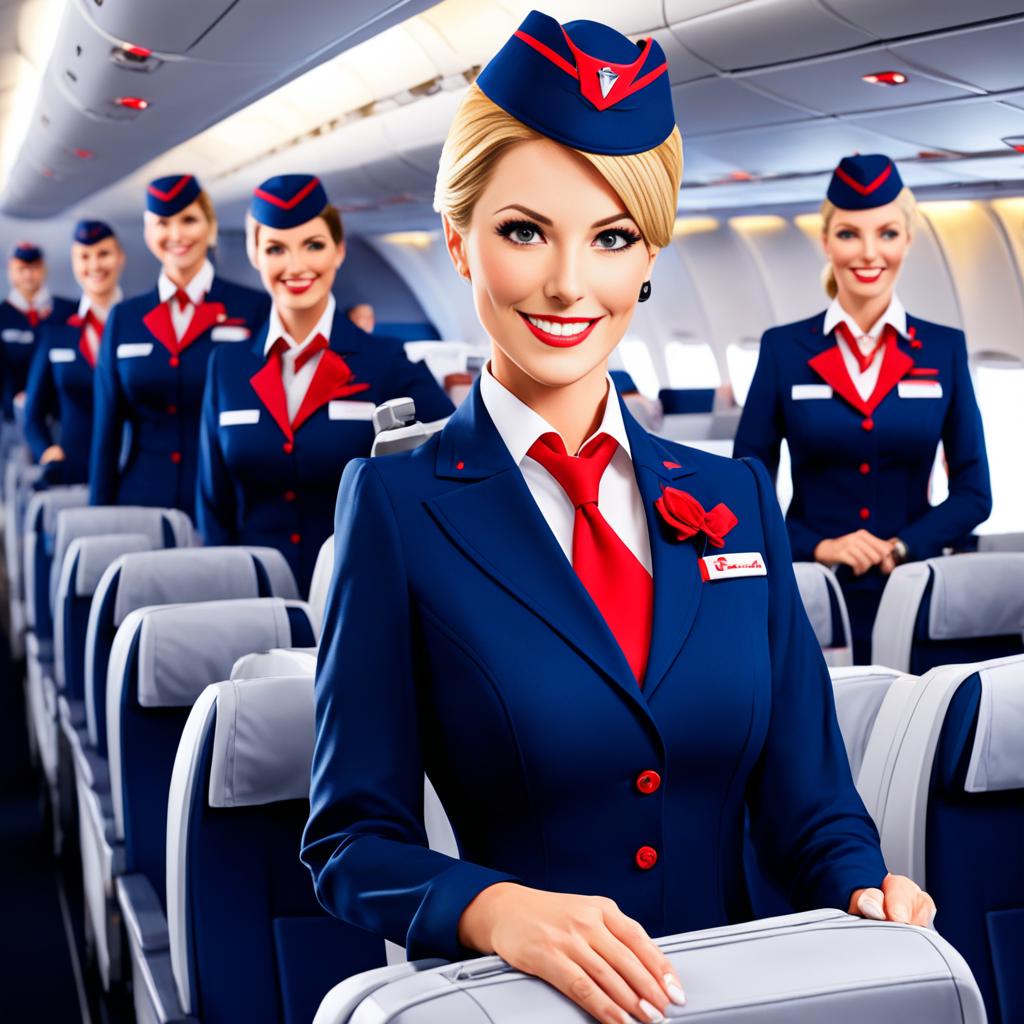Have you ever wondered what it takes to become a flight attendant at Delta Air Lines? Is it as difficult as people say it is? Well, buckle up, because we’re about to reveal the truth behind the rigorous selection process and intensive training that Delta flight attendants undergo.
Becoming a Delta flight attendant is highly competitive, with a low acceptance rate. In fact, in 2016, only 1% of the 150,000 applicants were selected. That’s lower than the acceptance rate for Harvard University’s class of 2021, which was 5.2%! So, what makes the process so challenging? Let’s dive into the requirements and training program that aspiring Delta flight attendants must go through.
The Competitive Nature of Delta Flight Attendant Training

Delta flight attendant training is highly competitive and known for its selectivity. In fact, it is harder to get invited to the Delta training center than to get into Harvard University. With 150,000 applications in 2016, Delta only accepted 1% of the applicants. This rigorous evaluation process ensures that only the most qualified individuals become Delta flight attendants.
In order to assess candidates, Delta employs various techniques such as video interviews, Q&A sessions, and in-person meetings. These evaluations help the airline determine the cultural fit of each candidate and select the best individuals for the training program.
The training program itself is known for its intensity and rigor. It is designed to prepare flight attendants for the responsibility of ensuring passenger safety and comfort on board Delta flights. Trainees undergo comprehensive training in safety procedures, emergency management, and customer service skills.
Delta’s commitment to maintaining high standards and selecting top talent is what sets its flight attendant training apart from others in the industry.
The Intensive Delta Flight Attendant Training Program

Delta flight attendants undergo an eight-week training program that equips them with the skills and knowledge required to excel in their role. This intensive training school covers a wide range of topics essential to their responsibilities onboard Delta flights.
During the program, trainees receive comprehensive safety training, which includes emergency procedures, evacuation protocols, and the operation of emergency equipment. They learn how to handle medical emergencies, perform CPR on adults, children, and infants, and provide essential first aid.
The eight-week training also focuses on customer service, teaching flight attendants the importance of delivering exceptional service to ensure passenger comfort and satisfaction. Trainees learn how to handle diverse passenger needs, manage challenging situations, and create a positive onboard experience for travelers.
Language proficiency is another key aspect of the training program. Delta recognizes the value of multilingual flight attendants and encourages language skills development. Trainees are encouraged to learn or improve their fluency in languages such as French, Czech, Danish, Dutch, Greek, German, Hebrew, Korean, Italian, or Swedish, allowing them to better assist and communicate with passengers from different backgrounds.
To ensure flight attendants are well-prepared for any situation, the training program includes immersive simulations. Trainees experience realistic scenarios like cabin evacuations, inflight emergencies, and managing unruly passengers. This hands-on experience helps build confidence, problem-solving skills, and the ability to make quick and effective decisions.
All trainees are evaluated thoroughly throughout the program, ensuring they meet Delta’s high standards. Performance assessments cover various aspects of the training, including safety, customer service, and language proficiency. Only those who successfully demonstrate their skills and knowledge graduate from the program and become Delta flight attendants.
| Training Topics Covered: | Training Duration: |
|---|---|
| Safety Training (Emergency procedures, evacuation protocols, operation of emergency equipment) | 8 weeks |
| Medical Emergency Handling (CPR on adults, children, and infants, first aid) | |
| Customer Service Training (Managing diverse passenger needs, handling challenging situations) | |
| Language Proficiency Development (Fluency in languages such as French, Czech, Danish, Dutch, Greek, German, Hebrew, Korean, Italian, or Swedish) | |
| Immersive Simulations (Cabin evacuations, inflight emergencies, unruly passengers) |
The eight-week intensive training program prepares Delta flight attendants with the necessary skills and knowledge to ensure passenger safety, deliver exceptional service, and handle any situation that may arise during their careers.
The Qualifications and Requirements for Delta Flight Attendants

To become a Delta flight attendant, you need to meet specific qualifications and requirements. These ensure that you have the necessary skills and attributes to excel in this role. Here are the key qualifications and requirements:
- Education: You must have a high school diploma, GED, or high school equivalency to apply for a position as a Delta flight attendant. This educational requirement ensures that you have a solid foundation of knowledge and the ability to handle the responsibilities of the job.
- Age: You must be at least 21 years old at the time of application. This age requirement ensures that you have the maturity and life experience necessary to handle the challenges and responsibilities of being a flight attendant.
- Language Proficiency: Delta requires flight attendants to have excellent English language skills. You must be able to speak, read, and write English fluently. Additionally, Delta is particularly interested in bilingual candidates who are fluent in English and another language. The languages of interest include French, Czech, Danish, Dutch, Greek, German, Hebrew, Korean, Italian, and Swedish. Being bilingual can be a valuable asset when interacting with diverse passengers and providing exceptional service.
- Eligibility to Work in the United States: As a Delta flight attendant, you must be eligible to work in the United States. This ensures that you comply with legal requirements and can legally fulfill the responsibilities of the position.
- Flexibility: Delta flight attendants must be willing to work flexible schedules, including overnight and international flights. This requirement allows Delta to meet the ever-changing demands of air travel and ensures that flight attendants can provide exceptional service to passengers at any time.
By meeting these qualifications and requirements, you position yourself as a strong candidate for a rewarding career as a Delta flight attendant. These criteria help Delta ensure that their flight attendants have the necessary skills, knowledge, and attributes to deliver exceptional service and ensure the safety and comfort of passengers throughout their journeys.
Take a look at the table below to get a visual summary of the qualifications and requirements for Delta flight attendants:
| Qualifications | Requirements |
|---|---|
| Education | High school diploma, GED, or high school equivalency |
| Age | At least 21 years old |
| Language Proficiency | Fluency in English; Bilingualism is a plus (English and another language) |
| Eligibility to Work | Eligible to work in the United States |
| Flexibility | Willingness to work flexible schedules, including overnight and international flights |
With these qualifications and requirements in mind, you can start preparing for a career as a Delta flight attendant and take the first step towards a rewarding and exciting journey in the aviation industry.
The Challenges and Rewards of Delta Flight Attendant Training
Delta flight attendant training offers a unique blend of challenges and rewards. Aspiring flight attendants may face obstacles along their journey, from waiting years to pursuing different careers to finally being accepted into the training program. The training process itself can be demanding, with stringent dress code and grooming policies that require trainees to adhere to Delta’s uniform and grooming rules. For instance, flight attendants are required to wear a wristwatch during flights, ensuring a professional appearance at all times.
Trainees also undergo evaluations of their personal image, highlighting the airline’s emphasis on maintaining high standards of professionalism. While these challenges may seem daunting, aspiring Delta flight attendants understand that the rewards of their chosen career far outweigh the difficulties they encounter during training.
Becoming a Delta flight attendant brings forth a multitude of rewards, starting with the opportunity to travel the world. As a flight attendant, you’ll have the chance to visit numerous destinations and experience diverse cultures. Each flight is a new adventure, offering you the opportunity to explore new places and create memorable experiences.
Additionally, Delta flight attendants have the privilege of meeting new people every day. Whether it’s interacting with passengers or working alongside fellow crew members, you’ll have the chance to connect with individuals from all walks of life. Building relationships and making impactful connections becomes an integral part of your daily routine as a Delta flight attendant.
Moreover, the training you receive as a Delta flight attendant equips you with essential knowledge and skills that can save lives. Through comprehensive medical and emergency training, you’ll be prepared to handle a wide range of situations and ensure the safety and well-being of passengers. The training program includes simulated exercises, allowing you to gain practical experience in handling medical emergencies, cabin evacuations, and challenging in-flight situations.
Overall, while Delta flight attendant training presents its share of challenges, the rewards make it a truly fulfilling and gratifying career choice. The opportunity to travel, meet new people, and make a positive impact on the lives of others is what sets being a Delta flight attendant apart.
| Challenges of Delta Flight Attendant Training | Rewards of Becoming a Delta Flight Attendant |
|---|---|
|
|
Delta’s Growing Demand for Flight Attendants
Delta Air Lines is experiencing a significant increase in flight attendants, with plans to hire over 4,000 new team members. The airline has recently added 1,940 flight attendants since February and continues to accept applications for future hiring. This surge in hiring presents excellent opportunities for aspiring flight attendants to join the Delta team and embark on a rewarding career in the airline industry.
If you have always dreamed of working as a flight attendant and are passionate about travel, customer service, and creating memorable experiences for passengers, now is the perfect time to consider applying at Delta. The application process is simple and straightforward, and Delta encourages enthusiastic individuals to take the first step towards their dream job.
To apply for a flight attendant position at Delta, you can conveniently submit your application online through the official Delta Air Lines website. Before applying, make sure to review and meet the qualifications and requirements set by Delta, ensuring that you are eligible for the position. These requirements typically include having a high school diploma or equivalent, being at least 21 years old, and possessing fluent English language skills.
The application process for aspiring Delta flight attendants consists of multiple stages, allowing the airline to carefully assess each candidate’s suitability for the role. These stages may include talent assessment, virtual job tryouts, on-demand interviews, in-person event days, and ultimately, job offers for successful candidates.
With Delta’s growing demand for flight attendants, this is an exciting time to pursue a career in the aviation industry. Delta Air Lines not only offers a competitive salary and comprehensive benefits package but also provides extensive training and development opportunities to ensure their flight attendants maintain the highest standards of service and safety.
Don’t miss out on the chance to be a part of Delta’s exceptional cabin crew. Apply today and take the first step towards an exciting and fulfilling career as a Delta flight attendant.
The Training Journey of a Delta Flight Attendant
After successfully completing the application process, you will embark on a training journey at Delta’s World Headquarters in Atlanta, Georgia. The training program, conducted over a seven-week period, is designed to equip you with the necessary skills and knowledge to excel as a Delta flight attendant.
The training program covers a wide range of important aspects, including:
- Safety Procedures: You will learn the essential safety procedures and protocols that are crucial for ensuring the well-being of passengers onboard. This includes training on emergency evacuations, securing cabin doors, operating emergency equipment, and handling in-flight medical situations.
- Emergency Management: You will be trained on how to effectively respond to various emergency scenarios, such as fires, water landings, and unruly passengers. The training will focus on equipping you with the necessary skills to remain calm, take charge of the situation, and ensure the safety of everyone onboard.
- Customer Service: Providing exceptional customer service is a vital aspect of being a Delta flight attendant. During the training, you will learn how to interact with passengers professionally, handle challenging situations, and deliver a positive and memorable experience for each traveler.
- Language Proficiency: As a Delta flight attendant, having language proficiency can be advantageous, particularly if you are fluent in English and another language. The training program may provide language classes or resources to enhance your communication skills.
Throughout the training, you will have the opportunity to participate in classroom instruction, simulated exercises, and hands-on practical experience to reinforce your learning. Delta takes great care to ensure that its flight attendants are well-prepared and confident in their abilities before they start their careers in the skies.
| Training Program Highlights | Duration |
|---|---|
| Safety Procedures | 3 weeks |
| Emergency Management | 2 weeks |
| Customer Service | 1 week |
| Language Proficiency | 1 week |
The Continued Commitment to Excellence for Delta Flight Attendants
Delta flight attendants are committed to maintaining high standards and continuously improving their skills through ongoing training and professional development. As part of their career journey, Delta flight attendants are required to undergo regular training to stay updated on safety procedures, emergency management, and customer service.
One important aspect of this commitment is the annual exams that Delta flight attendants must pass. These exams serve as a demonstration of their knowledge and competence in their areas of expertise, ensuring that they are equipped to handle any situation that may arise during a flight.
Delta Airlines understands the importance of continuous improvement, and as such, provides flight attendants with ongoing professional development opportunities. These opportunities allow flight attendants to enhance their skills, explore new techniques, and stay up-to-date with industry best practices. Delta’s dedication to training and development ensures that flight attendants are well-prepared to deliver exceptional service and ensure the safety and comfort of every passenger.
By maintaining high standards and investing in the ongoing professional development of their flight attendants, Delta Airlines continues to prioritize excellence in every aspect of their operations. Through their commitment to continuous training and development, Delta flight attendants are equipped to provide a positive and enjoyable travel experience for all passengers.
FAQ
Q: Is it difficult to become a flight attendant at Delta?
A: Yes, becoming a flight attendant at Delta Air Lines is highly competitive with a low acceptance rate. In 2016, only 1% of the 150,000 applicants were selected.
Q: What is the acceptance rate for Delta flight attendants?
A: The acceptance rate for Delta flight attendants is only 1%, making it highly competitive.
Q: What is the training process for Delta flight attendants?
A: Delta flight attendants must undergo an eight-week training program that covers safety, emergency procedures, and customer service.
Q: What qualifications and requirements are needed to become a Delta flight attendant?
A: To become a Delta flight attendant, candidates must have a high school diploma or equivalent, be at least 21 years old, and be fluent in English. Bilingual candidates are particularly encouraged to apply.
Q: What are the challenges and rewards of Delta flight attendant training?
A: Delta flight attendant training can be challenging, but it also offers unique rewards such as the opportunity to travel the world and save lives through medical and emergency training.
Q: Is Delta hiring flight attendants?
A: Yes, Delta Air Lines is currently hiring over 4,000 new flight attendants and continues to accept applications for future hiring.
Q: Where does Delta conduct its flight attendant training?
A: Delta flight attendants undergo training at Delta’s World Headquarters in Atlanta, Georgia.
Q: What ongoing training and development opportunities are available for Delta flight attendants?
A: Delta flight attendants are expected to maintain high standards and undergo continuous training throughout their careers. The airline offers ongoing professional development opportunities to enhance their skills and stay up-to-date with industry best practices.
